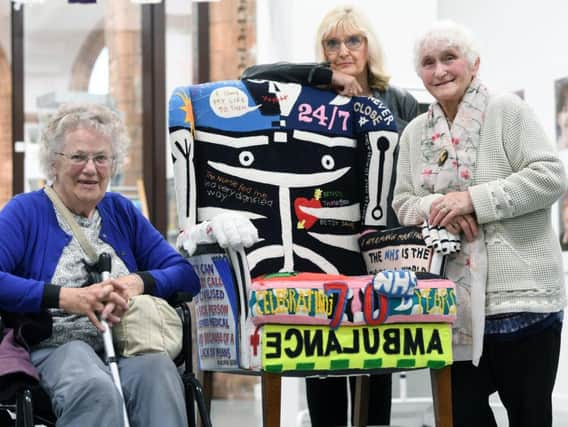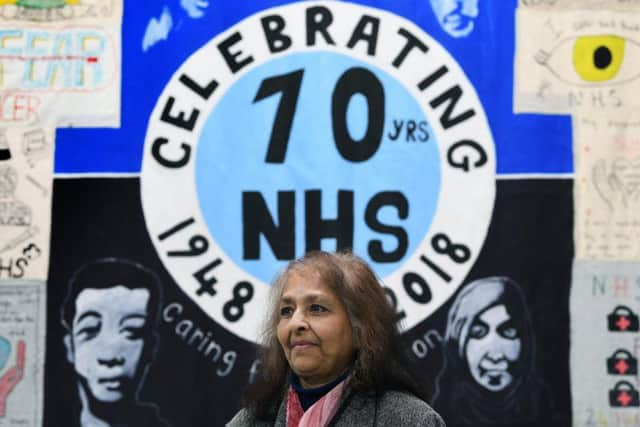'NHS saved my life' - Leeds exhibition explores health service experiences


To use her words, Beatrice Rogers “pre-dates” the National Health Service and having witnessed first-hand the inequality in access to care prior to its introduction 71 years ago, she is a vehement supporter.
“I had polio in 1939. I was three years old,” she says. “I was born just outside Wigan, but the good thing was that I came under the Lancashire County Health Authority and not Wigan Borough.
Advertisement
Hide AdAdvertisement
Hide Ad“Mine owners had paid for a hospital especially for the children under 16 from Lancashire county and it had


the best orthopaedic service in the land. But children from Wigan couldn’t go to it. People who talk about a postcode lottery – get real. It was absolute then.”
It was seven more years before the NHS was founded. Only then was Beatrice’s consultant able to refer her to a shoemaker for specialist, bespoke footwear that she had needed since contracting the viral infection - and that she has worn ever since.
Life-changing
“When the National Health came in, in 1948, I was old enough to recognise the big difference that it had,” she recalls. “People were walking around with a smile.
Advertisement
Hide AdAdvertisement
Hide Ad“They could hardly see but now they could go and have their eyes tested, or they could have their ears tested...The National Health changed people’s lives. There’s no question about that.”
Beatrice is the secretary of Leeds Hospital Alert, a group of residents who since 1981 have united in their wish to defend the NHS and its principle that care should be free and accessible to everyone regardless of income or status.
“The only thing I’ll carry a banner for is the National Health,” Beatrice says. It needs more money, she maintains, and she does not look favourably on privatisation, claiming “it will be disastrous”.
“People don’t think about the NHS until they need it, and if privatisation carries on, they’ll be going for it and it won’t be there.”
Staff and patient
Advertisement
Hide AdAdvertisement
Hide AdFellow member Maureen Idle has experienced the service as an employee, as well as a patient.
The 76-year-old was a nurse for 25 years. “I’ve always been interested, never wanted to do anything but nursing from being a child,” she says. “I do remember my mother telling me that [a relative] was circumcised on the kitchen table before the NHS.”
Her training, at the age of 33, was at Leeds St James’ Hospital and involved several ward placements including her first in gynaecology. “In those days, there was no such thing as day surgery. Even for things like a miscarriage or termination, they were still staying in overnight.
“Because of minor operations, you had a big turnover of patients going into theatre, and you’d still have to do all the observations when they came back so it was quite busy.”
Advertisement
Hide AdAdvertisement
Hide AdAfter qualifying, her first role was in a disabled unit at Newton Green, in Chapel Allerton Hospital. “They wouldn’t be in hospital now,” she says. “They weren’t ill. They were disabled.”
Four years ago, Maureen was at the receiving end of NHS care, having been diagnosed with breast cancer.
“The treatment just makes me cry when I think about it. It was so wonderful. I have always said that if I paid £10m, I couldn’t have had better...The NHS is very, very precious.”
Exhibition
The recollections and views of Maureen and Beatrice are among those that have been documented as part of a Leeds project to celebrate the NHS at 70 and its impact on the local area.
Advertisement
Hide AdAdvertisement
Hide AdArts and community organisation Space2 launched the project as the health service reached its 70th milestone last year, with funding from the Heritage Lottery Fund.
Over the past year, it has been recording stories of patients, volunteers, campaigners and staff and has captured their voices in creative work including poetry, a storybook, trade union-style banners, an appliquéed chair and clinical-inspired screens with quotes and photographs.
Already, part of the work has been on show at Thackray Medical Museum, Chapeltown Library and The Old Fire Station in Gipton, and a full exhibition, which also features medical memorabilia from Thackray and NHS-related books from Leeds Libraries, is now being held at Leeds Central Library.
“There is little else that has touched the lives of so many people in the way the NHS has,” Space2 says. “That is why we wanted to take a deeper look at the people of Leeds and their relationship with the pioneering institution.”
Saving lives
Advertisement
Hide AdAdvertisement
Hide AdFor Leeds residents June Maw and Bharti Dhamecha, that relationship is one of deep gratitude to the staff that helped them recover from life-threatening conditions.
Bharti, who was born in India, suffered from sepsis, falling ill in July last year. She spent five and a half months in hospital, including in a coma in intensive care, with an infection in her back and spine, which meant she could not move her arms or legs and had to be tube fed.
The 63-year-old, who is still having physiotherapy with the NHS, has high praise for the medical staff at Leeds General Infirmary, St James’ Hospital and Chapel Allerton.
“Thanks to the NHS, they saved my life and I’m here today,” she says. “I felt there were very encouraging doctors around me and people helping me that got me through really.”
Advertisement
Hide AdAdvertisement
Hide AdJune, who was a doctors’ receptionist at practices across Leeds for three decades, has spent much of the past four years of her life in the care of the NHS with successive health problems, beginning with an empyema lung infection.
“I was in St James’ for six weeks and I just wasn’t getting better,” she recalls. The doctor took one look one day and said, ‘you’re not getting any better’ then he said to my husband, ‘Mick are you squeamish?’
“He said ‘no, I used to be a firefighter’. So the doctor said ‘will you help me?’ So we went into a room and they gowned up and Mick was assisting him when he was draining the lung. As soon as they started to do that, I started to feel better.”
A few months later, June was back in hospital, after developing abscesses on the brain. “Apparently, I was about an hour away from death. But they operated, a wonderful, wonderful neurosurgeon operated.”
Advertisement
Hide AdAdvertisement
Hide AdThat was not the end of June’s ordeal. Two years ago, she was diagnosed with cervical cancer and underwent a hysterectomy to remove her womb.
“Things were done very quickly. Luckily, it was in its very early stages, so they took absolutely everything to be sure.”
The NHS, she maintains, has saved her life. “I wouldn’t be here without it. Nobody would I don’t think. It is wonderful.”
'Phenomenal staff'
The Many Happy Returns exhibition shares stories of life and health both before and after the establishment of the NHS and is running at Leeds Central Library until Friday, July 5.
Advertisement
Hide AdAdvertisement
Hide AdJelena Zindovic, a project manager and artist at Space2, has worked on the project.
“I think the best thing about the NHS is that no matter what your social status is, no matter what your race or background is, we are all welcome and all have that without needing to pay,” she says.
Jane Morland, who carried out some of the interviews for the project, said at times she was in tears listening to patients’ heartfelt stories.
“I’m very passionate about the NHS and I think that the staff that work within it are phenomenal. I don’t think they are given enough credit for the day to day stresses and strains that they have to put up with. They’re incredibly empathetic and they do a brilliant job.”